Globalisation Class 12 Political Science
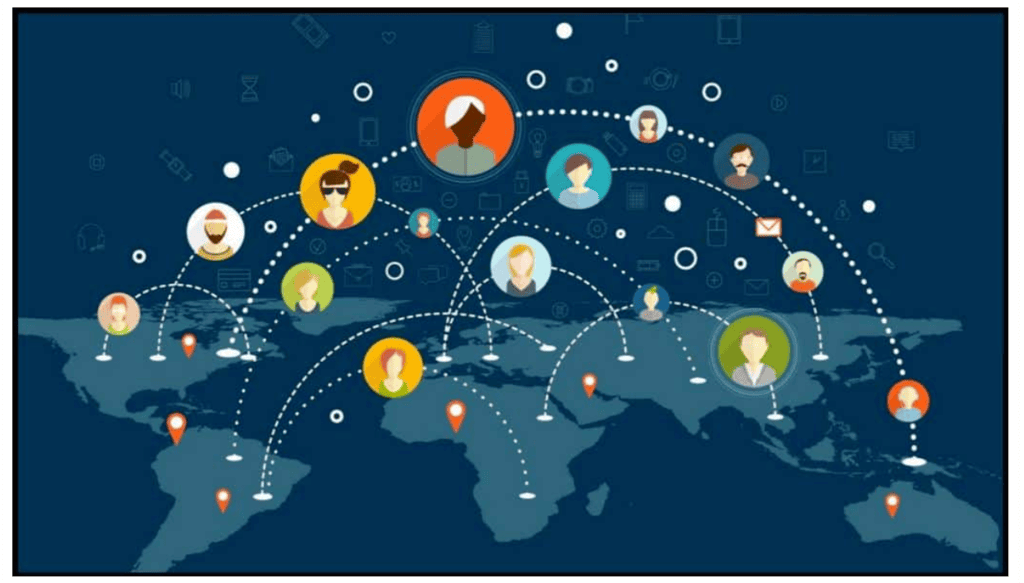 Globalisation
Globalisation
Introduction to Globalisation
Globalisation is about how countries are connected through the movement of people, ideas, money, and goods across the world. It affects politics, economics, and culture by breaking down old boundaries and changing traditional ways of doing things.
The Concept of Globalisation
- Globalization is a broad term that refers to the movement of people, ideas, capital, and goods among various regions of the world. It has several different dimensions. It shows itself in political, economic, and cultural ways, and these must be sufficiently differentiated.
- Globalization as a concept is mostly concerned with flows. These flows may include the transfer of ideas between regions of the world or the international trade of goods, among other things. The most important factor is the interconnectedness that these continuous flows build and maintain on a worldwide scale.In real life, you can find many examples of globalisation around you:
- The phone you are using is probably ideated in one country, its parts are manufactured in another country and it is assembled in yet another country.
- A film writer can be 'inspired' for a movie idea by a Hollywood movie.
- The clothes we wear are more and more inspired by the west.
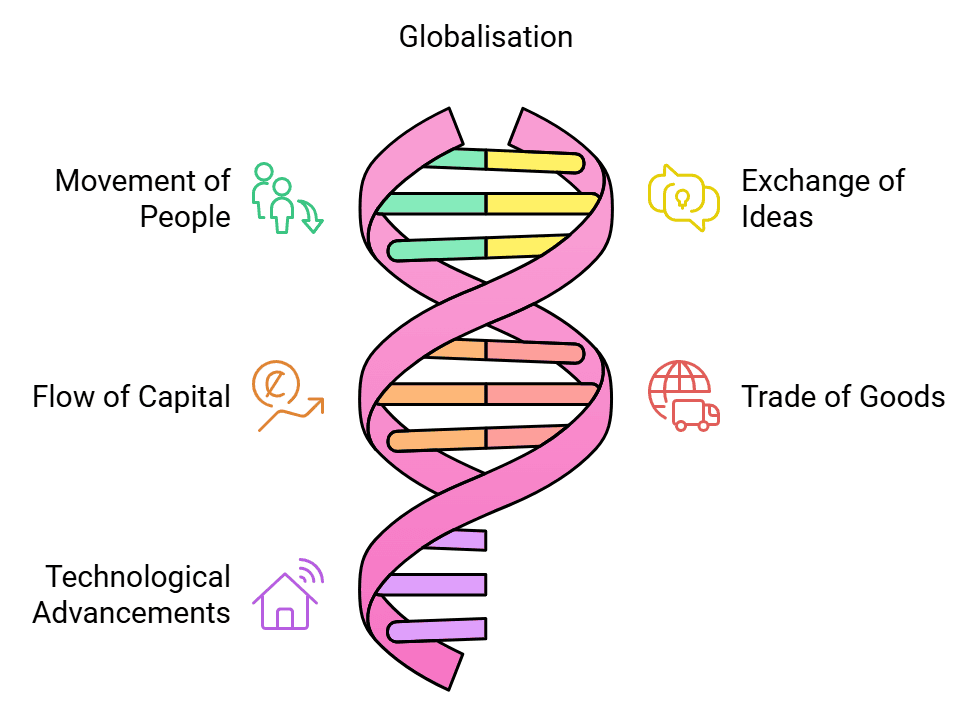
Causes of Globalisation
- Historically, globalisation has always played an important role. But what has changed in the contemporary world that it has changed the scale and speed of globalisation? The causes of globalisation are as follows:
- Technology: Technological advancements have made it feasible for people, capital, commodities, and ideas to travel around the world more readily. The revolutionary changes in communications around the world has played an important role.
- Recognition of interconnections: People around the world recognise that everything is interrelated. For instance, the COVID-19 pandemic was not limited to national boundaries.
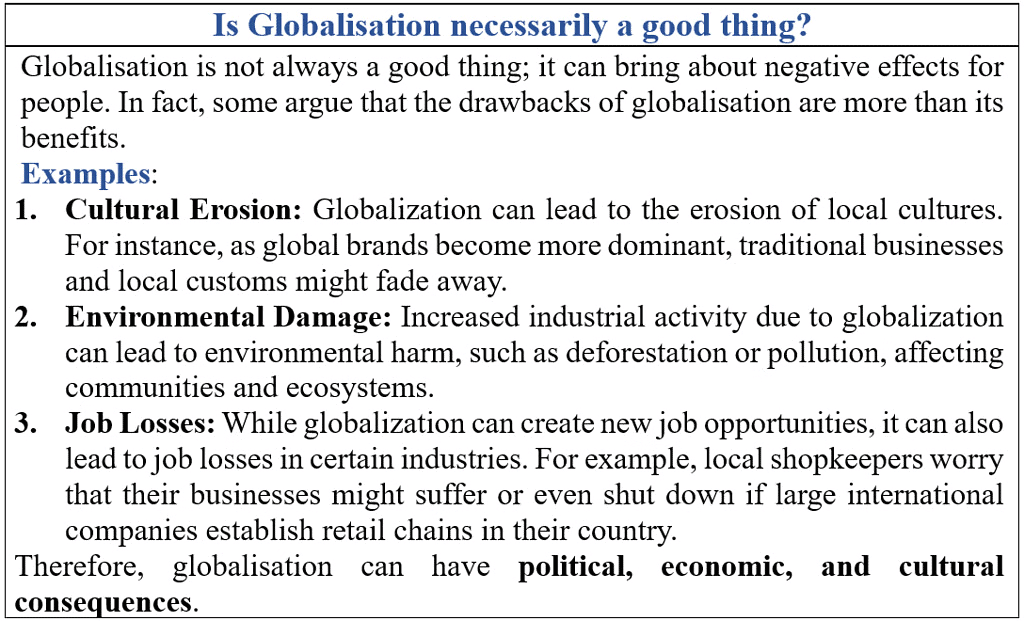 Is Globalisation good?
Is Globalisation good?
Consequences of Globalisation
There are various consequences of globalisation, which can be categorised into three main categories as follows: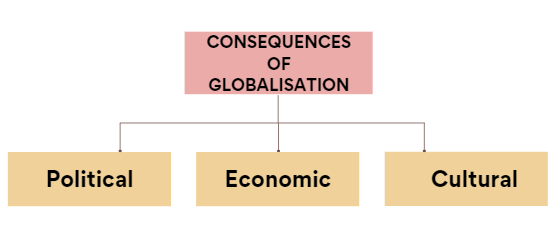
Political Consequences
Reduction in State Capacity:
- Globalization is often associated with a reduction in state capacity, referring to the government's ability to plan, implement policies, and exercise authority within its borders. This reduction is attributed to various factors.
- International organizations, agreements, and treaties can constrain a government's ability to act independently in areas such as trade, finance, and environmental regulation.
Minimalist State and Core Functions:
- As globalization progresses, there is a trend towards a more minimalist role of state that focuses on essential functions, such as maintaining law and order and ensuring the security of its citizens.
- Governments may be compelled to reduce their involvement in economic affairs, as the market becomes a dominant force in determining economic and social priorities.
Market as the Main Determinant:
- With globalization, the influence of the market tends to expand, influencing economic decisions and social priorities that were traditionally within the purview of the state.
- Market forces, driven by global competition, can lead to a downsizing of state enterprises and a shift towards privatization as governments seek to improve efficiency and competitiveness.
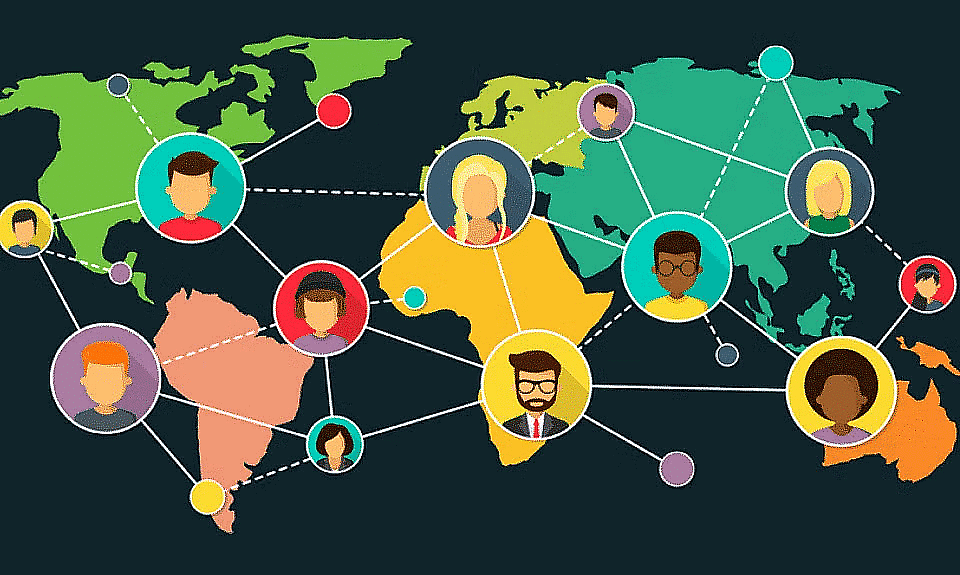
Increased State Capacity Through Technology:
- Despite the challenges posed by globalization, the primacy of the state as the fundamental political community remains unchallenged in many respects.
- States still retain significant authority over their territories, and the legal and political systems within their borders continue to be a defining feature of political organization.
- Improved information and communication technologies enable states to gather data on their populations more efficiently, enhancing their capacity for surveillance, law enforcement, and public administration.
- Advanced technologies also empower governments to participate in global networks, collaborate with other states, and respond to transnational challenges such as terrorism and cyber threats.
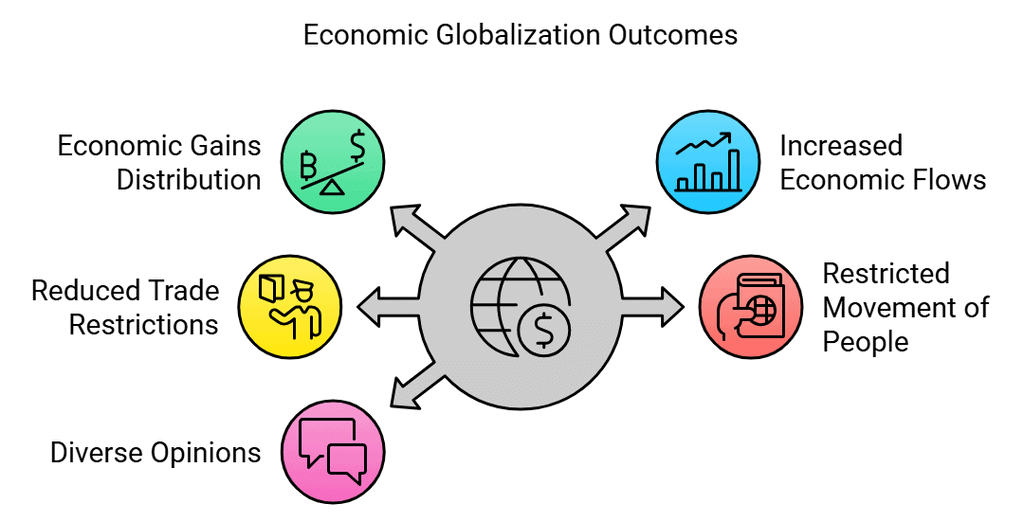
Economic Consequences
Multiple Actors in Economic Globalization:
- IMF and WTO: International Monetary Fund and World Trade Organization.
- Understanding distribution of economic gains: Broad comprehension beyond key organizations is crucial to understand the economic consequences of globalisation. It is essential to understand who gets more and who gets less as a result of globalisation.
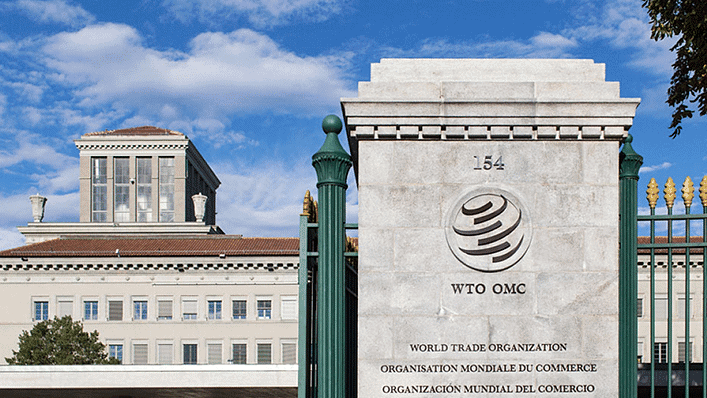 World Trade Organisation
World Trade Organisation
Increased Economic Flows:
- Voluntary and Compelled Flows: Economic interactions involve both voluntary exchanges and compelled transactions by international organizations and powerful nations.
- Nations Involved: Greater economic flows among nations worldwide.
Reduced Restrictions on Trade:
- Globalization Impact: Imposition of fewer restrictions on imports, fostering increased trade. For instance, import bans and duties have been reduced in India across sectors in the last few decades.
- Trade in Commodities: Greater global trade in various commodities including consumer and capital goods.
Movement of People remains Restricted:
- Even with increased globalisation, the movement of people remains restricted.
- Developed countries have enforced strict visa policies to protect their borders and prevent foreign citizens from taking jobs away from their own people.
Diverse Opinions on Economic Globalization:
- Intense Division of Opinion: Economic globalization evokes varied and strong opinions globally. Different parts of the world have benefitted from it differently.
- For instance, India has gained from the movement of capital because of technological advancements in the country. However, small and medium enterprises continue to suffer due to global competition.
- Beliefs: Some see limited benefits, while others argue for its positive impacts.
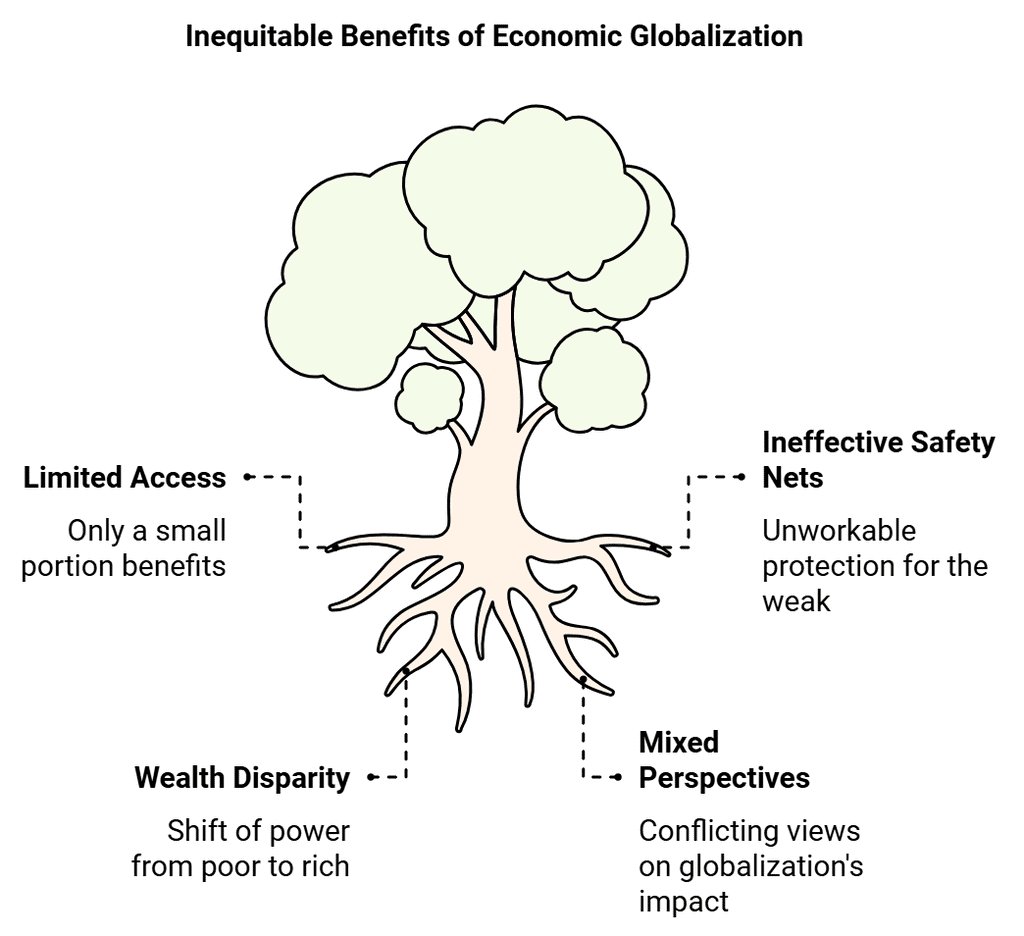
Benefit Distribution and Economic Growth:
- Benefit Distribution: Debate on whether only a small portion of the population benefits from economic globalization.
- Emphasis on Social Safety Nets: Some have argued to protect the economically weaker sections from the negative effects of globalisation. However, these nets are often considered unworkable. Stronger opinions have called for a stop to forced economic globalisation.
- Re-colonisation of the world: Since globalisation has resulted in shift of power and wealth from the poor to the rich, some economists have termed it as re-colonisation of the world.
- Advocates' View in favour of globalisation: Supporters argue that economic globalization contributes to higher economic growth and improved living conditions for broader segments of the population.
Cultural Consequences
- Globalization's effects are not limited to the fields of politics and the business; they can also be observed in our culture.
- The process of cultural globalisation poses a threat because it leads to the rise of a uniform culture throughout the world or what is called cultural homogenisation.
- Cultural globalisation has both positive as well as negative effect on the world.
- Globalization has a component of cultural homogenization, yet the same process also has the precise opposite result.
India and Globalisation
- In Indian history, flows relating to the flow of capital, commodities, ideas, and people date back to centuries.
- However, India became an exporter of primary commodities and raw materials as well as a consumer (importer) of finished goods during British rule.
- After independence, India decided to be a self-sufficient country rather than being dependent on others for necessities like food.
- India also restricted imports from other countries to protect and promote domestic producers. This policy is known as protectionism.
- India witnessed slow economic growth during the first few decades after independence.
- India started an economic reform programme in 1991 with the goal of deregulating more and more industries, including trade and foreign investment.
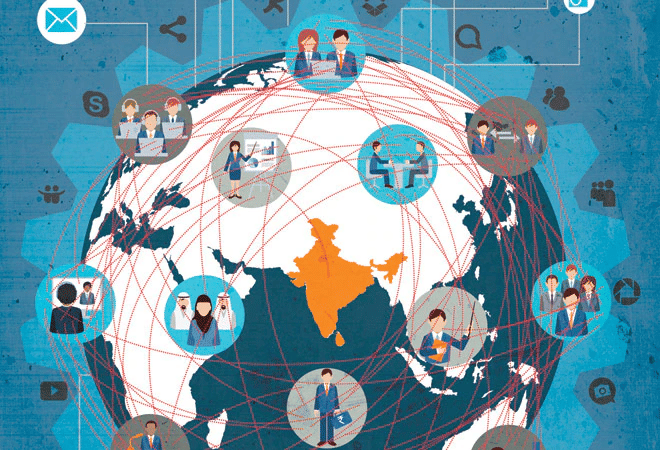
Resistance to Globalisation
Harsh Criticism of Globalization:
- Global Criticism: Globalization faces widespread criticism worldwide.
- Economic Inequality: Perceived as a phase of global capitalism leading to increased wealth disparity.
Political concerns: The role of the states is weakened due to international pressures.
Economic concerns: Due to the increase in inequalities, economics argue for a return of self-reliant and protectionist policies in some aspects of the economy
Cultural Concerns: Concerns that age-old values may erode due to cultural changes.
Anti-Globalization Movements:
- Global Networks: Movements critical of globalization operate on a global scale.
- Alliances: Align with like-minded groups internationally to amplify their impact.
World Social Forum (WSF):
- International Platform: WSF serves as a platform against neo-liberal globalization.
- Participants: Includes advocates for human rights, environment, labor, youth, and women.
- Opposition to Neo-liberalism: Focus on resisting economic policies favoring liberalization.
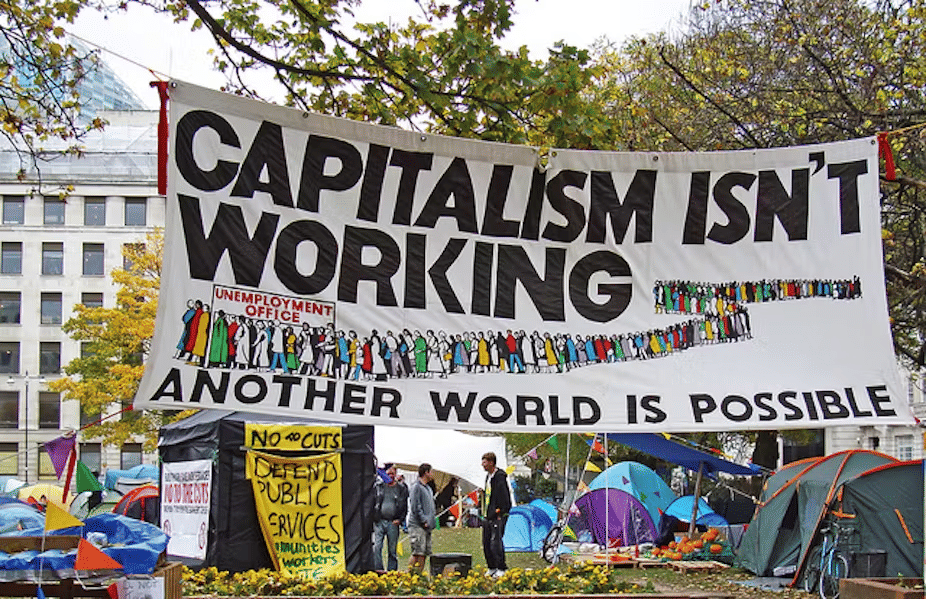 World Social Forum
World Social Forum
India and Resistance to Globalisation
- Indians have faced opposition to globalisation from a variety of sources.
- There have been left wing protests to economic liberalisation voiced through political parties as well as through some forums like the Indian Social Forum.
- The political right has also raised objections to globalisation. This has given rise to a forum for criticising diverse cultural influences in particular.
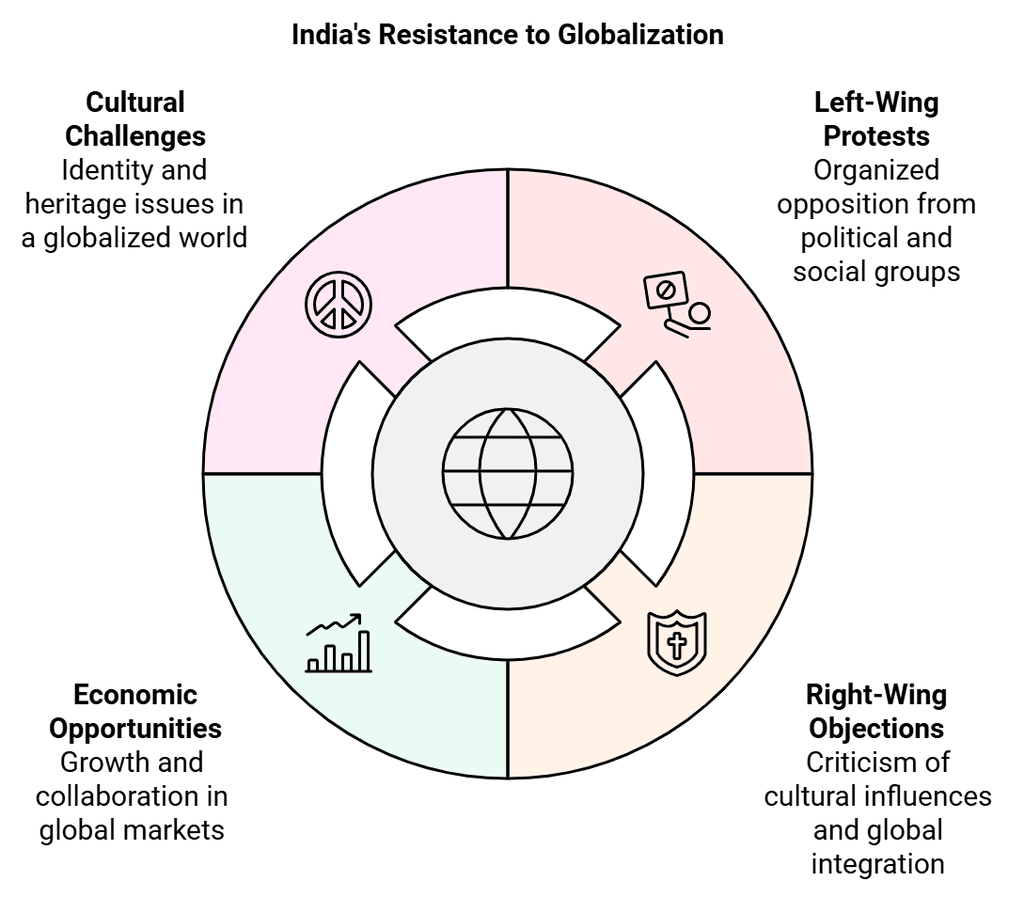
Conclusion
In conclusion, globalisation brings both opportunities and challenges. Economically, it helps countries grow and work together but can also makes inequality worse. Politically, it tests how much control countries have while encouraging cooperation. Culturally, it mixes different ways of life, raising questions about identity and heritage. Managing these changes means finding a balance between global connections and keeping what makes each place unique in our fast-changing world.
|
34 videos|308 docs|51 tests
|
FAQs on Globalisation Class 12 Political Science
| 1. What is the definition of globalisation? |  |
| 2. What are the economic consequences of globalisation? |  |
| 3. How does globalisation affect cultural aspects in different countries? |  |
| 4. What role does India play in the context of globalisation? |  |
| 5. What are the forms of resistance to globalisation observed in India? |  |

















